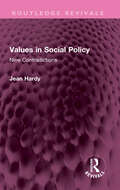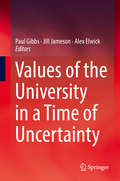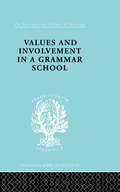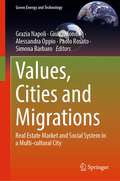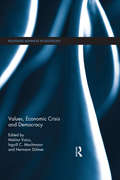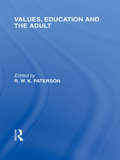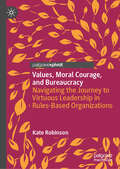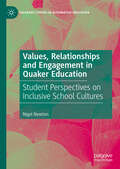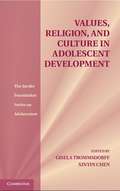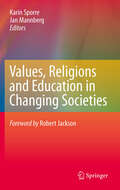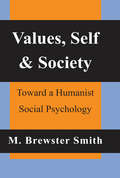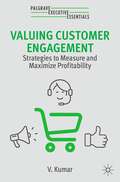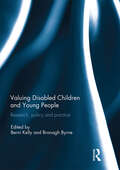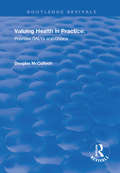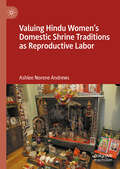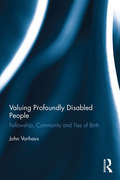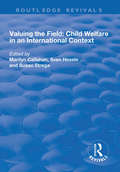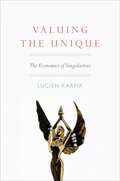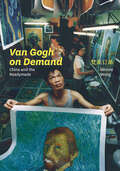- Table View
- List View
Values in Social Policy: Nine Contradictions (Routledge Revivals)
by Jean HardyFirst published in 1981, Values in Social Policy provides a means towards understanding the conflicts, contradictions and uncertainties involved in working in a welfare state. In the nine chapters, Jean Hardy explores the conflicting values posed within nine contradictions: authority versus liberation, for example, or the personal versus the political, equality versus freedom, bureaucracy versus professionalism. The author demonstrates how values can be contrasted with their supposed opposites; she traces the roots of the different values and, in so doing, sets out a clear and original account of the issues involved when choices have to be made and decision taken. This book will be of interest to students of sociology, social policy, and economics.
Values in Youth Sport and Physical Education
by John Lambert Jean Whitehead Hamish TelferAs sport has become more intense, professional and commercialized so have the debates grown about what constitutes acceptable behaviour and fair play, and how to encourage and develop ‘good’ sporting behaviour, particularly in children and young people. This book explores the nature and function of values in youth sport and establishes a framework through which coaches, teachers and researchers can develop an understanding of the decision-making processes of young athletes and how they choose between playing fairly or cheating to win. The traditional view of sport participation is that it has a beneficial effect on the social and moral development of children and young people and that it intrinsically promotes cultural values. This book argues that the research evidence is more subtle and nuanced. It examines the concept of values as central organizing constructs of human behaviour that determine our priorities, guide our choices, and transfer across situations, and considers the value priorities and conflicts that are so useful in helping us to understand behaviour in sport. The book argues that teachers and professionals working with children in sport are centrally important agents for value transmission and change and therefore need to develop a deeper understanding of how sport can be used to encourage pro-social values, and offers suggestions for developing a curriculum for teaching values through sport in differing social contexts. Spanning some of the fundamental areas of sport practice and research, including sport psychology, sport pedagogy, practice ethics, and positive youth development through sport, and including useful values and attitudes questionnaires and guidance on their use and interpretation, this book is important reading for any student, researcher, coach or teacher with an interest in youth sport or physical education.
Values of the University in a Time of Uncertainty
by Paul Gibbs Jill Jameson Alex ElwickThis deliberately wide-ranging book addresses issues related to trust, compassion, well-being, grace, dignity and integrity. It explores these within the context of higher education, giving existential and empirical accounts of how these moral duties can be expressed within the academy and why they ought to be. The chapters range from values used in the marketing and management of institutions to their realisation in therapeutic and teacher training spaces. The book opens with a specific introduction which positions the work and outlines the context of duties and obligations at play. This is followed by two distinct but related sections including chapters on theoretical issues, organisational practices and personal praxis. The first part is more abstract and theoretical, the second locates the values discussed within the practices of the university. In doing so the book encompasses a wide range of issues from multi-disciplinary and geo-political regions. The authors are a mixture of world-leading authorities on values in higher education and earlier career researchers, who are nonetheless equally passionate contributors. This mix gives the book vibrancy and offers insight which appeals to both an academic and managerial readership.
Values&Involv Gram Sch Ils 240 (International Library of Sociology)
by Ronald KingFirst Published in 1998. Routledge is an imprint of Taylor & Francis, an informa company.
Values, Cities and Migrations: Real Estate Market and Social System in a Multi-cultural City (Green Energy and Technology)
by Alessandra Oppio Giulio Mondini Paolo Rosato Grazia Napoli Simona BarbaroThis book collects the best papers presented at a recent conference organized by SIEV (Italian Society of Appraisal and Valuation) to promote the interaction between Appraisal and Valuation and other social sciences to study the effects of migration on value and social, spatial and economic systems in a multicultural city. The book consists of seventeen papers in two parts. The first part, "Values and Relational Systems in Multicultural Societies", features how social sciences--including appraisal and valuation, urban planning, philosophy, psychology, and geography--take different approaches to studying values and relationships, converging to form a unified mosaic of complementary and interconnected knowledge. The second part, "Permeability and Permanence of Values in a Contemporary Multicultural City", highlights the most crucial topics on which appraisals and models focus to interpret and represent the influence of migration on the real estate market in different urban and territorial contexts, from historical centers, small towns, to tourist cities, also taking into account sustainability, maintenance and regeneration of cities.
Values, Economic Crisis and Democracy (Routledge Advances in Sociology)
by Ingvill C. Mochmann Malina Voicu Hermann DFor the past decade European countries have undergone a severe economic crisis, with severe consequences both for individuals and for governments. Unemployment and rising poverty have compelled individuals to reconsider their own priorities and goals, while governments have been forced to rethink social policies on the national level, as well as their international economic and political agreements. Some countries have been more deeply affected by the crisis than others, and the impact of economic shortage on individuals and governments has differed, not only because of the different magnitudes of the crisis, but also because individuals react differently to the contextual changes. This book makes use of cross-national survey data to explore the impact of wealth and economic contexts on social values. Instead of attempting to explain how aggregate changes occur (as previous volumes have done) the chapters in this collection focus on micro-level effects to interrogate more deeply the interplay between attitudes and values – and the way both can change as a result of transformation of economic context. This book elaborates on several dimensions of value change: the measurement model and the way it changes under the impact of economic shortage; the connection between universal value orientations and attitudes towards different objects (e.g. the welfare state, immigrants and ethnic groups); the effects of economic factors and vulnerability on values and attitudinal orientations; how particular political and economic contexts produce changes in political orientations. This book focuses on the interrelationship of social values, attitudes and economic scarcity in the context of the last economic crisis experienced by many European countries. It will appeal to scholars and students of sociology, political science and economics.
Values, Education and the Adult (International Library of the Philosophy of Education Volume 16)
by R.W.K. PatersonIn this study of the main conceptual and normative issues to which the education of the adult gives rise, the author demonstrates that these issues can be understood and resolved only by coming to grips with some of the central and most contentious questions in epistemology, philosophy of mind, ethics, and social philosophy. A salient feature of the book is its searching examination of the different types of value judgement by which all educational discourse is permeated. The analysis of the nature and justification of educational judgements forms the basis of an overall philosophy of adult education which should provide a much needed axiological framework for the guidance of practitioners in this growing area of educational concern.
Values, Moral Courage, and Bureaucracy: Navigating the Journey to Virtuous Leadership in Rules-Based Organizations
by Kate RobinsonThis book focuses on understanding values-based leadership in rules-based organizations. It assists leaders, whether they are Board Members, CEOs, Executives, or Middle to Lower Management, in understanding how to enact and embody values/virtues-based leadership. Of particular interest to readers are the discussions around primary data collected from participants at three levels of leadership in the military who responded to a vignette and interview. The results of the case study are used in conjunction with current trends or practices that are considered unethical and questionable behavior which undermine trust and integrity in organizations. By using a case study from the military, the highly codified rules-based organization illustrates the tensions, contradictions, and paradoxes that leaders face and provide a teachable moment for leaders in all industries the complexities in achieving virtue eudaimonia. In doing so, the book also illustrates the tension and complexities between an individual’s multiple subject positions, organizational rules and values, and the ability to have agency.
Values, Relationships and Engagement in Quaker Education: Student Perspectives on Inclusive School Cultures (Palgrave Studies in Alternative Education)
by Nigel NewtonThis book provides a unique critical perspective on the importance of values to school culture. Drawing on research in Quaker schools in England, and the perspectives of students, it challenges the idea that school evaluation should be primarily based on measurable outcomes and argues that values matter more to learning than is often acknowledged. Furthermore, the book provides important insights on how to research schools that claim to hold similar values, from multi-academy chains to other so-called faith schools. Throughout the text, the author underscores the importance of values to students’ dispositions, in order to engage with the learning opportunities their schools provide. He argues for seeing schools as places where equality, inclusiveness and mutual respect should be central, not only to help students understand our fragile, multicultural democracy, but also because these values open up the possibility of learners’ increased engagement with curriculum knowledge.
Values, Religion, and Culture in Adolescent Development
by Xinyin Chen Gisela TrommsdorffCultural values and religious beliefs play a substantial role in adolescent development. Developmental scientists have shown increasing interest in how culture and religion are involved in the processes through which adolescents adapt to environments. This volume constitutes a timely and unique addition to the literature on human development from a cultural-contextual perspective. Editors Gisela Trommsdorff and Xinyin Chen present systematic and in-depth discussions of theoretical perspectives, landmark studies, and strategies for further research in the field. The eminent contributors reflect diverse cultural perspectives, transcending the Western emphasis of many previous works. This volume will be of interest to scholars and professionals interested in basic developmental processes, adolescent social psychology, and the sociological and psychological dimensions of religion.
Values, Religions and Education in Changing Societies
by Karin Sporre Jan MannbergEducation is a societal matter and takes place in relation to societal changes. Today, in many countries, it has to grapple with diversity and differences brought about by migration and changes in gender relations. Questions of values, human rights and the role of religions are raised. In this book scholars from Sweden, Norway, Germany, Great Britain, Canada, Namibia and South Africa discuss the issues above. Similarities as well as differences are highlighted. The varied contributors engage in a North-South dialogue. Among the questions addressed are: Can the Scandinavian countries be understood as more religious than their up-to-date, seemingly secularist reputation has led us to believe? How do some European, Muslim, Christian and secular pupils understand the religious education they receive? Could a global citizenship education, with a gendered understanding as an integral part, be accomplished? 'Diversity' and 'social justice': what does it take to theoretically integrate these two crucial parameters in education, in South Africa, and in Sweden? The role of religious and values education under changing circumstances is explored through the diverse contributions, that also challenge the hegemony of a Western understanding of democracy, among other values. The purpose of this is to assess what could now constitute global educational common ground.
Values, Self and Society: Toward a Humanist Social Psychology
by Mahlon Brewster SmithIn a tough opening statement, M. Brewster Smith outlines his own life course and contrasts it with the agenda of social psychology in the present professional moment. "Today's journals, textbooks, and conferences represent a vigorous but narrow scientific specialty in psychology, the practitioners of which are more closely focused on agendas that are primarily and often only intelligible within the subdiscipline than was the case when I formed my identity as a psychologist." In contrast, Smith sees himself, and has long been seen by others, as a social psychologist in the tradition of Gordon Allport, Gardner and Lois Murphy, Kurt Lewin, and Muzafer Sherif. Smith's unique ability has been to contribute to the emergence of personality as a differentiated academic field and at the same time maintain strong interdisciplinary ties to a variety of fields ranging from sociology to philosophy. In recent years, such concerns have made the author a central figure in the development of Humanistic Psychology as a part of the American Psychological Association. Because of these wide ranging concerns, the major statements of Brewster Smith have appeared in diverse places. Here, brought into a unified and uniform frame of reference, one has his work on values and selfhood, humanistic psychology and the social sciences, and humanism and social issues brought together for the first time. The picture is of a major thinker who is at home in the details of psychology and in the broad areas of public interest and social policy. Brewster Smith discusses major issues in terms of the political processes involved in the public interest. These range from the issue of advocacy within social research to conceptualizing anew familiar issues within psychology. For the generalist interested in the broader meanings of social psychology to the specialist aiming to recapture the big issues with which the field was once identified, this is a must volume.
Values-Based Commissioning of Health and Social Care
by Christopher Heginbotham ObeHealth and social care commissioning is a values-driven as well as evidence-driven enterprise. However, whereas there has been an expectation that the evidence-base of commissioning should be made fully explicit, the corresponding values-base has been left largely implicit. The book addresses this subject through a detailed discussion of values and values-based practice, illustrated with case examples, and by developing a critique of existing commissioning. This approach enables commissioners to identify and make explicit the often diverse values of all those involved, whether as commissioners, providers or users of services. It provides a skills base and other support processes for working with differences in values held by all those engaged in making commissioning decisions. This will be essential reading for doctors, both experienced and in training, commissioning managers, professional staff in NHS Foundation Trusts and the private sector and all 'at the sharp' end of practice.
Valuing Care Work
by Helga Hallgrimsdottir Cecilia BenoitThere are many forms of paid and unpaid labour encompassed in health care systems, including home care for the elderly or disabled, community health services, and the care family members provide for loved ones. Valuing Care Work is an international comparative study that examines economic organizations as well as intimate settings to show how personal service work is shaped by broader welfare state developments.To trace the relationships between gender, labour, and equity in health care, the essays in this volume analyse the rules and practices that shape care work. The contributors highlight how national configurations of the welfare state shape the gendering of paid and unpaid intimate labour in a range of settings and discuss how the policies and practices associated with neoliberalism have focussed on efficiency and accountability to the detriment of other policy agendas, including those that might further increase dignity and equity for both recipients and providers of paid and unpaid health care.
Valuing Children: Rethinking the Economics of the Family (The Family and Public Policy #5)
by Nancy FolbreNancy Folbre challenges the conventional economist's assumption that parents have children for the same reason that they acquire pets--primarily for the pleasure of their company. Children become the workers and taxpayers of the next generation, and "investments" in them offer a significant payback to other participants in the economy. Yet parents, especially mothers, pay most of the costs. The high price of childrearing pushes many families into poverty, often with adverse consequences for children themselves. Parents spend time as well as money on children. Yet most estimates of the "cost" of children ignore the value of this time. Folbre provides a startlingly high but entirely credible estimate of the value of parental time per child by asking what it would cost to purchase a comparable substitute for it. She also emphasizes the need for better accounting of public expenditure on children over the life cycle and describes the need to rethink the very structure and logic of the welfare state. A new institutional structure could promote more cooperative, sustainable, and efficient commitments to the next generation.
Valuing Customer Engagement: Strategies to Measure and Maximize Profitability (Palgrave Executive Essentials)
by V. KumarIn recent years, the concept of customer engagement has evolved as a powerful tool in the managerial toolkit of firms to incorporate a profitable approach to customer management. There is a pressing need for an authoritative book that communicates the fundamentals of profitable customer engagement by proposing a customer engagement value framework. This book, Valuing Customer Engagement, is first of its kind on customer engagement that outlines the theory and methods of engaging customers profitably in business-to-consumer and business-to-business settings.Written by world-renowned scholar and thought leader V. Kumar, this seminal work book explains the definitions of the metrics within the CEV framework and analyzes ways to measure and maximize these metrics that can help in engaging customers profitably. Dr. Kumar also reveals the interrelationships between these metrics, i.e. how each metric impacts the other, with examples from all over the world.This updated edition introduces of Customer Valuation Theory as a way of quantifying direct and indirect engagement value while presenting newer applications and case studies. With practical examples of companies that have benefited by implementing these strategies, this guide is a must have for business executives who want to maximize companies profitability as well as students wanting to learn how to engage customers and build loyalty.
Valuing Disabled Children and Young People: Research, policy, and practice
by Berni Kelly and Bronagh ByrneFocusing on contemporary childhood disability issues, and relevant to the lived experiences of disabled children and young people and their families, this book addresses themes such as transition, identity, education, inclusion, and service provision. It also includes insightful contributions on participatory research and practice with disabled children and young people, including an emphasis on capability, voice, and communicative spaces for those with life limiting and more severe levels of impairment. The contributions to this book are grounded in a commitment to the rights of disabled children and young people, as explicitly recognised under the United Nations Conventions on the Rights of the Child (1989) and Rights of Persons with Disabilities (2006). However, the authors also draw our attention to the detrimental impact of economic austerity and conflict on the extent to which these rights are being realised, encouraging further consideration of issues relating to social justice, inter-dependence, and participation. Addressing the diversity of disabled children’s lives across service domains and international contexts, this book provides an evidence base to support the realisation of the rights of disabled children and young people. This book was originally published as a special issue of Child Care in Practice.
Valuing Health in Practice: Priorities QALYs and Choice
by Douglas McCullochThis title was first published in 2002. Most of those working in health services are aware of scarcity and the need for choice, and many also know that health sector choices in the future may be made on a "cost per quality-adjusted-life-year" (QALY) basis. This volume explains health service choice, focusing in particular on the QALY success story, and the merits and drawbacks of this measure are explained. On the basis of some of the problems identified, a new QALY-based approach to resource allocation is developed, and other methods of priority setting are explained, ranging from heart surgery to Alzheimer's Disease. The author explains the problems of health sector choice from first principles, in an approach that should be particularly useful to healthcare professionals, pharmaceutical industry managers, and students of economics.
Valuing Hindu Women’s Domestic Shrine Traditions as Reproductive Labor
by Ashlee Norene AndrewsHistorically in middle-class Bengali Hindu households it has been the matriarch’s responsibility to arrange and maintain the domestic shrine and to perform daily rituals of deity worship and caretaking—termed in this book as domestic shrine traditions. These traditions are often assimilated with the other domestic caretaking labor women are expected to complete for their families. Utilizing a years-long ethnography with Bengali American Hindu women, and drawing from Marxist feminist Social Reproduction Theory, this book argues that domestic shrine traditions are reproductive labor that is essential to the transnational and transgenerational sustenance of Hindu traditions and subjectivities. As the first monograph focused on Hindu women’s domestic shrine traditions in the United States, this book illuminates both the value of these traditions for the women who maintain them, and how these traditions connect immigrant Hindus to family and ethno-religious identity in ways unmatched by the public Hindu temple or organization.
Valuing Profoundly Disabled People: Fellowship, Community and Ties of Birth (Routledge Research in Special Educational Needs)
by John VorhausGrowing numbers of human beings live with profound and multiple learning difficulties and disabilities. Exploring the moral, social and political implications of this trend, Valuing Profoundly Disabled People addresses questions that are high on policy and practice agendas in numerous regions around the world, including the UK and the EU, the USA, and Australasia. In this important work Vorhaus examines fundamental moral and social questions about profound disability, and each chapter combines a comprehensive review of existing literature with thought-provoking and original philosophical arguments. Vorhaus argues that there is a pressing need to consider the moral and political claims of people whose lives are characterised by extensive impairments, dependency and vulnerability. The book prompts readers to reflect on complex issues relating to the practices of caring, teaching and treating people with profound disabilities in contexts such as education, health care and social policy. Providing a much-needed contribution to the field, this book will be of interest to postgraduates, academics and researchers in a number of distinct and interrelated fields, including disability and impairment, human rights, philosophy, sociology, health and social policy, and education. The book will also be of great interest to practitioners and policymakers seeking to promote the aims of realising human potential and respecting disability.
Valuing the Field: Child Welfare in an International Context (Routledge Revivals Ser.)
by Marilyn Callahan Sven Hessle Susan StregaThis title was first published in 2000: This text provides international perspectives on examples of best practice in child welfare and proposes organizational structures and policies to support this practice. Practice innovations span the range of child welfare services, including prevention, protection and out-of-family care. The contributors describe the child welfare context in each of their particular jurisdictions, producing an addition to the literature comparing child welfare in different countries. Moreover, existing books on the subject are primarily descriptive and examine overall child welfare legislation and policy. The work adopts an analytical approach, proposing policies and focusing on the largely unexamined topic of excellence in child welfare practice.
Valuing the Unique: The Economics of Singularities
by Lucien KarpikIn this landmark work of economic sociology, Lucien Karpik introduces the theory and practical tools needed to analyze markets for singularities. Singularities are goods and services that cannot be studied by standard methods because they are multidimensional, incommensurable, and of uncertain quality. Examples include movies, novels, music, artwork, fine wine, lawyers, and doctors. Valuing the Unique provides a theoretical framework to explain this important class of products and markets that for so long have eluded neoclassical economics. With this innovative theory--called the economics of singularities--Karpik shows that, because of the uncertainty and the highly subjective valuation of singularities, these markets are necessarily equipped with what he calls "judgment devices"--such as labels, brands, guides, critics, and rankings--which provide consumers with the credible knowledge needed to make reasonable choices. He explains why these markets are characterized by the primacy of competition by qualities over competition by prices, and he identifies the conditions under which singularities are constructed or are in danger of losing their uniqueness. After demonstrating how combinations of the numerous and multiform judgment devices can be used to identify different market models, Karpik applies his analytical tools to the functioning of a large number of actual markets, including fine wines, movies, luxury goods, pop music, and legal services.
Van Gogh on Demand: China and the Readymade
by Winnie Won Yin WongIn a manufacturing metropolis in south China lies Dafen, an urban village that famously houses thousands of workers who paint van Goghs, Da Vincis, Warhols, and other Western masterpieces for the world market, producing an astonishing five million paintings a year. To write about work and life in Dafen, Winnie Wong infiltrated this world, first investigating the work of conceptual artists who made projects there; then working as a dealer; apprenticing as a painter; surveying wholesalers and retailers in Europe, East Asia and North America; establishing relationships with local leaders; and organizing a conceptual art exhibition for the Shanghai World Expo. The result is Van Gogh on Demand, a fascinating book about a little-known aspect of the global art world--one that sheds surprising light on the workings of art, artists, and individual genius. Confronting big questions about the definition of art, the ownership of an image, and the meaning of originality and imitation, Wong describes an art world in which idealistic migrant workers, lofty propaganda makers, savvy dealers, and international artists make up a global supply chain of art and creativity. She examines how Berlin-based conceptual artist Christian Jankowski, who collaborated with Dafen's painters to reimagine the Dafen Art Museum, unwittingly appropriated the work of a Hong Kong-based photographer Michael Wolf. She recounts how Liu Ding, a Beijing-based conceptual artist, asked Dafen "assembly-line" painters to perform at the Guangzhou Triennial, neatly styling himself into a Dafen boss. Taking the Shenzhen-based photojournalist Yu Haibo's award-winning photograph from the Amsterdam's World Press Photo organization, she finds and meets the Dafen painter pictured in it and traces his paintings back to an unlikely place in Amsterdam. Through such cases, Wong shows how Dafen's painters force us to reexamine our preconceptions about creativity, and the role of Chinese workers in redefining global art. Providing a valuable account of art practices in an ascendant China, Van Gogh on Demand is a rich and detailed look at the implications of a world that can offer countless copies of everything that has ever been called "art. "
Vandalism and Anti-Social Behaviour
by Roger Hopkins Burke Matt LongThere has been a lack of theorisation and conceptualisation of vandalism and anti-social behaviour in criminology in the decades following Cohen's seminal typology of vandalism in the 1970s. This important book forwards a new typology of vandalism, one that addresses the various challenges of the late modern world, rather than the older industrial world Cohen addressed. Matt Long and Roger Hopkins Burke analyse the various types of vandalism and anti-social behaviour conducted by individuals. However, they highlight that individuals are not always the locus of blame - the state also has the capacity to act in a profoundly anti-social way. Crucially, Long and Hopkins Burke argue that in order to fully understand vandalism and anti-social behaviour, a culturally criminological perspective should be fostered. This is a perspective which accounts for both the emotional and experiential aspects of crime as well as its broader social and political contexts.
Vandalismus an Schulen
by Ina HerrmannKritzeleien und Graffiti werden alltagstheoretisch als Vandalismus und somit als grundlegend negativ konnotierte Ausdrucksformen bezeichnet. Jedoch lassen sich vandalistische Praktiken als akteursseitige 'Gebrauchsspuren' oder ,Inbesitznahmen' lesen, die im Rahmen dieser Studie als manifester Bestandteil einer Schularchitektur rekonstruiert werden. Vor dem raumtheoretischen Hintergrund sind die latenten Bedeutungsstrukturen der sog. Maskierungen des Schulraums zu verorten und hinsichtlich der Frage nach inh#65533;renten Bildungspotentialen zu diskutieren.
